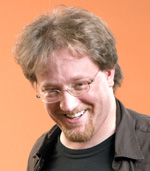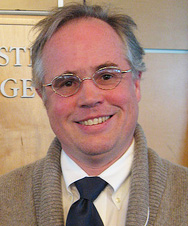WiLSWorld Conference—July 21-22, 2010
Digital Review Day 1 | Digital Review Day 2
Featured Keynote Speakers

The conference will commence with a keynote by Tim Spalding, who founded LibraryThing in 2005 as a personal project. LibraryThing is a social cataloging and social networking site for book lovers around the world. LibraryThing also provides catalog enhancement software to libraries, including widgets and a mobile OPAC.

Eric Lease Morgan, Head of the Digital Access and Information Architecture Department, University of Notre Dame, will present the second day keynote. He is perhaps best known for creating MyLibrary, a set of software modules implementing a digital library framework. Eric is also the author of Alex, a collection of public domain and open access documents with a focus on American and English literature as well as Western philosophy.
| Times | Wednesday, July 21st |
| _________ 8:00-9:00 _________ |
________________________ Registration with coffee and pastries ________________________ |
| 9:00-10:15 | Keynote: Social Cataloging and the Future Tim SpaldingTim Spalding introduces “Social Cataloging” at LibraryThing and around the library world. Social cataloging embraces tagging, user reviews and other “user generated content.” Tim will show examples of success and also of failure, and connect the principles and best practices of social cataloging to that of “cooperative cataloging” and the future of the catalog—and of the library. |
| __________ 10:15-10:30 __________ |
_______________________ Break with coffee _______________________ |
| 10:30-11:45 _________ |
Three Concurrent Sessions ________________________ |
| A Conversation With Tim Spalding | |
| Resource Discovery: I Know It When I See It (Resource Discovery) Pete Gilbert, Lawrence UniversityResource Discovery: you’ve heard your friends talk about it and have wondered if it’s for you. You’ve asked yourself: Does it have layers? Is it expensive and complicated? Does my catalog really want to be integrated? And what about my brand identity? We’ll talk about concepts, look at examples, and generally explore the exciting world of Resource Discovery — whatever the heck that is. |
|
| Mobile Development: Choose your platform, pick your battle (Mobile Development) Rebecca Holz, UW-Madison Ebling LibraryMany questions should be answered when one sets out to develop a mobile site. Should we have one site that serves double-duty, or a separate mobile site? Do we build a native application or a web app? What platforms do we support? What content do we include? Do we even need a mobile site at all? This session covers our answers to these questions and the development of the Ebling Library mobile site as well as suggestions and resources to get you started. |
|
| _________ 11:45-1:15 _________ |
______________________ Lunch on your own ______________________ |
| 1:15-2:30 _________ |
Three Concurrent Sessions __________________________ |
| Library Programming with LAMP: Pros & Cons for the Solo Developer Maccabee Levine, UW-OshkoshOne of the most popular choices for web programming is the LAMP software stack, despite (or because of) its age: Linux, Apache, MySQL and PHP. UW Oshkosh’s Polk Library used LAMP to build two recent projects: a web-searchable Naturalization Records Index for the Archives & Area Research Center, and a Library Course Pages project that creates a customizable library page linked from Desire2Learn for every course at the university. Maccabee will briefly describe these two projects and discuss why he chose the venerable LAMP stack, the advantages at a library with only one programmer, and modern alternatives that may be preferable for other projects. |
|
| LibraryH3lp: An affordable and scalable IM/Chat platform for libraries (Library H3lp pdf) Steve Frye and Pete Boguszewski, UW-MadisonIn the summer of 2009, the UW-Madison replaced our chat and IM service software with LibraryH3lp. This presentation will provide an overview of LibraryH3lp, an integrated web chat/IM platform written specifically by a librarian for libraries. LibraryH3lp routes all Web-chat, instant messaging, and SMS calls through the LibraryH3lp gateway and then directs those calls to specific librarians, library services, or libraries through the use of queues. Along the way we’ll cover transferring calls, staffing issues, the use of screencasting, assessment issues, and the use of Google voice in providing an SMS/texting service via LibraryH3lp. |
|
| Opening What’s Closed: Using Open Source Tools to Tear Down Vendor Silos Ken Varnum, University of Michigan Library (Opening What’s Closed pdf or see below)The University of Michigan Library’s web site is a consistent, integrated front end on what was a collection of 19 distinctly different library sites and multiple library silos. The library’s site now combines a variety of tools (including Drupal, VuFind, Springshare’s LibGuides, Ex Libris’s Metalib, DSpace, and Solr) within a single interface. In this talk, you will learn about the design process that informed the system architecture and the way we are using data from both open source and proprietary software to break down information silos. |
|
| ________ 2:30-2:45 ________ |
__________________________ Break with water, soda–sorry no cookies… more room for hors d’oeuvres! __________________________ |
| 2:45-4:00 _________ |
Three Concurrent Sessions __________________________ |
| Forward In Reverse: A Gentle Overview Of Forward System Architecture
View more presentations from ewlarson.
Eric Larson, Steve Meyer, and Mike Simpson, UW-Madison Forward is a resource discovery experiment building a unified search interface for library data, that currently indexes all UW System library catalogs and several UW digital collections. This presentation will explore the system architecture and software design elements supporting the Forward service: user interface, major application components, and underlying frameworks and toolkits. We will also outline the challenges we are facing in indexing and displaying data of many different types, and from many different sources. |
|
| Gadgets, Widgets and other Embeddables: Microcontent for the Masses (Gadgets, Widgets pdf) Allan Barclay, UW-Madison Ebling LibraryTechnologies like RSS and Javascript have created a brave new world where useful content can be mixed and matched in ways unthinkable just a short time ago. Personalized start pages like iGoogle allow content creators to reach a diverse audience, and allow users to create the information dashboard of their dreams. We’ll take a look at the creation and use of these increasingly popular tools, including iGoogle gadgets, embeddable code snippets, toolbars and more. A minimal investment of time and effort can go a long way, almost viral if it really finds an enthusiastic audience. |
|
| Migration of Digital Content to Fedora Peter Gorman, UW-MadisonThe UW Digital Collections Center is in the process of creating a new repository infrastructure to manage all of its digital content. Fedora Commons was selected as the software best suited to the task of providing a stable, flexible archive for images, text, and other kinds of content, independent of the applications used to create, discover, and navigate it. Peter Gorman will show Fedora Commons’ place in the digital ecosystem, demonstrating how objects of varying complexity can be represented, preserved, and made available to users in a variety of ways. |
|
| _________ 4:00-5:00_________ |
_______________________ All-Conference Reception cash bar and hors d’oeuvres _______________________ |
| Times | Thursday, July 22nd |
| _________ 8:00-8:30 _________ |
_____________________ Breakfast Served _____________________ |
| _________ 8:30-10:00 _________ |
Member Breakfast Program The program for the WiLS Member Breakfast this year is going to be an informal review of the New WiLS. Brief overviews of specific services/projects presented by the respective libraries—how it worked, how it was valuable. Very informal—no head table, no powerpoints allowed! Patrick Wilkinson, in-coming WiLS Board Chair, will introduce the program and serve as Emcee. |
| 10:15-11:30 | Keynote: Electronic Texts and the Evolving Definition of Librarianship(Next Next-Generation Library Catalog pdf) Eric Lease Morgan, University of Notre DameContent is being “born digital” at an ever-increasing rate. Such an environment provides an enormous set of opportunities for our profession. Yet we — as a whole — still act as if librarianship is about books. Much of what we have done is simply automate previously existing workflows. We have yet to truly exploit what computers can do. Just as librarianship is not about books, it is not about computers either. Instead it is a set of processes including collection, preservation, organization, and dissemination of data, information, and knowledge without regard to format or container. This presentation elaborates on these ideas while pulling examples from the Alex Catalogue of Electronic Texts and various “digital humanities” projects. |
| __________ 11:30-11:45 __________ |
_______________________ Break with coffee, water, soda _______________________ |
| 11:45-1:00 __________ |
Three Concurrent Sessions __________________________ |
| A Conversation With Eric Lease Morgan | |
| The iPad and Its Application in Libraries Keith Mountin, Senior Systems Engineer, Apple IncIntroducing the iPad for Education: On April 3rd Apple welcomed a new addition to the family…The iPad! In this session we will look at this unique device and how it can fit into your learning environment. As part of this experience we will help you to understand where this exciting new tools fits into the digital ecosystem of your learning environment and how it can be used to increase learning for your students. We will also take time to look at new applications, e-books and uses of the device as a result of it’s convenient form factor. |
|
| The National Broadband Plan and the Changing Broadband Landscape (National Broadband Plan pdf) Bob Bocher, Division for Libraries, Technology, and Community LearningIn March the Federal Communications Commission released the nation’s first National Broadband Plan. One of its goals is that community anchor institutions—like libraries and schools—have affordable 1Gbps broadband service. This program will highlight the plan’s impact on the library and education communities including issues like developing community area networks and maintaining an open Internet (Net Neutrality). |

